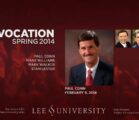
Ordained Bishops Age Limitations: Discussion on Church of God General Assembly, Nashville 2016
Church of God General Assembly, Nashville 2016
“ordained ministers 25 years of age and older”
Rationale: “….the motion, if passed, provides greater incentive for attendance to International General Assemblies and
ministerial credential advancement….”
Premise: A lot was said about ordaining younger ministers around the 2012 Assembly. The proposed Item 25, properly numbered recommending lowering the age requirement to 25 years, did not pass. Naturally, discussions stopped perhaps in wait for the next Assembly. But the question still stands open before our church.
Data on Average Age of our Ministers
Age 20-30 3.62% Ministers, .62% pastors
Age 31-40 12.61% Ministers, 8.09% pastors
Age 41-50 19.98% Ministers, 21.85% pastors
Age 51-60 25.84% Ministers, 32.18% pastors
Age 61 plus 37.95% Ministers, 37.27% pastorsLess than 9% of our pastors are under 40. Roughly 70% are 51 and over. The 20-30 numbers can be a little skewed because of many youth pastors and children pastors, etc. However, only 16% of ministers are under 40.
Rationale: This motion seeks to affirm the value of a new generation of ministers by giving them voice and vote in shaping the future mission, vision, and core values of the Church of God. It also expands the International General Council to include ordained women, whose anointed insights and spiritual discernment are much needed in addressing the growing complexity of fulfilling the Great Commission.
Ordained ministers are currently permitted to serve in the Church of God as pastors, ministers, chaplains, missionaries, and a wide variety of other vital ministries. As such, they are held accountable to the recommendations of the International General Council and decisions of the International General Assembly, yet they do not have opportunity to share their insights, ideas, experiences, wisdom, discernment, and concerns in the formation of those recommendations. This proposal seeks to remedy that. Additionally, the motion, if passed, provides greater incentive for attendance to International General Assemblies and ministerial credential advancement. Finally, if passed, service in an official elected or appointed capacity such as the presiding bishop, the International Executive Committee, the director and assistant director of Youth and Discipleship, the director and assistant director of World Missions, the Council of Eighteen (18 ), administrative bishops, and any other so identified by the Minutes will continue to be restricted to ordained bishops (S5. I. SELECTION, Item 5, International General Assembly MINUTES, page 67; S22. III. RIGHTS AND AUTHORITIES, Item 2, International General Assembly MINUTES, page 101).
Reasoning & Logistics: When an active pastor is not allowed to vote in business sessions, the congregation he pastors is left voiceless. Alas, all business carried at the assembly affects the said church, which basically has no representation in General Council. So if a church pays for its young pastor to be sent to Assembly and represent the congregation, but without the right to vote this representation does not amount to much in the end. There is something fundamentally wrong with this. The argument of age is of course connected with one’s experience. But let’s face it, multitudes of pastors leave the ministry for one reason or another having already gained both age and experience. And unfortunately, so many of them leave exactly because of the experience they have had aging within the church. Actually in today’s world, if you have not gained enough life experience and if you don’t know yourself by age 25, you will most probably not gain what’s needed by age 30. Therefore, if a man is appointed to be pastor of a church by consideration and approval of the Administrative Bishop, he should be allowed to vote. If he is trusted enough to take care of the church’s spiritual life and business, surely he must be trusted to represent his congregation and vote toward its betterment as a part of the whole organization.
Further questions:
- How desperately do we need new blood in COG leadership?
- What is our Current Context of Leadership and Elections?
- Do you have to think young if you want your church to grow?


